Nov 26, 2025. Osaka, Japan, Dharma Q&A with Japanese Interpretation
Hello. Today, Sunim is giving a Dharma Q&A in Osaka, Japan.
After completing morning practice and meditation, Sunim had breakfast at the accommodation at 6:30 AM. After breakfast, he attended to some work before conducting a live broadcast of the Weekly Dharma Assembly from the accommodation at 10 AM.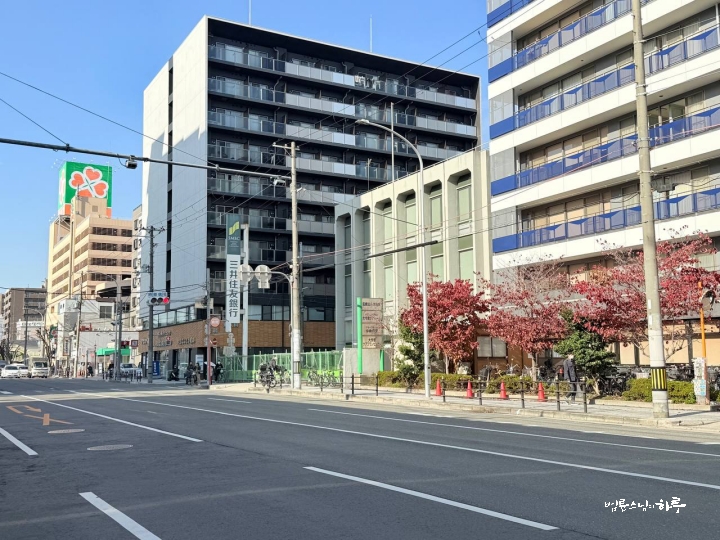
Once all Jungto Society members had entered the video conference room, they watched a video showcasing the activities of Jungto practitioners over the past week. After the video ended, the assembly requested a Dharma talk from Sunim with three bows. Following a brief meditation, Sunim gave his greeting.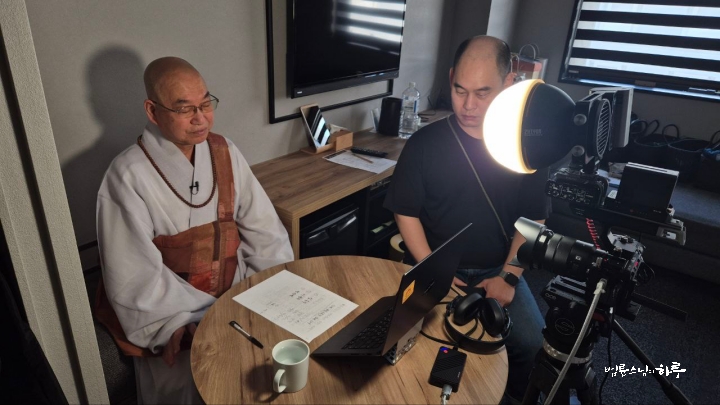
“I am currently in Osaka for the Japan tour Dharma assemblies that continue through tomorrow. This evening, there will be a Dharma assembly for Korean residents and local Japanese people in Osaka, and tomorrow I will conduct a Dharma Q&A in Tokyo. The weather in Japan is quite chilly, similar to Korea.
Korea and Japan: Time to Move Beyond the Past Toward Cooperation
Despite Japan’s geographical proximity to Korea, surprisingly many people don’t know much about Japan. Japan’s territory is about three times that of South Korea, its population is about two and a half times larger, and its per capita GDP is at a similar level to ours. Among countries with populations exceeding 100 million, Japan is the only one after the United States to have achieved this level of economic development. It can be considered a country with a significant economic scale globally.
While we have emotional distance from Japan due to our painful history, Korea and Japan are currently very closely connected economically. Especially in the current international situation with intensifying US-China conflicts, it benefits both countries to cooperate beyond past wounds. Additionally, about 600,000 Korean residents live in Japan. Therefore, to help these residents, their second-generation children, and even Japanese people live happier lives, Jungto Society has started not only Korean resident Dharma assemblies but also Jungto Dharma School for Japanese people here.”
He then received questions about various concerns. Three people had pre-registered questions and engaged in dialogue with Sunim. One of them shared their struggle with guilt after losing their mother, unsure of how to continue living.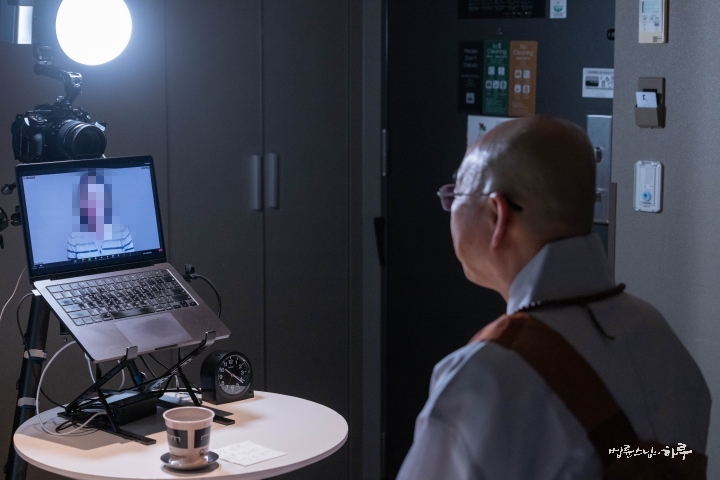
I Think I Caused My Mother’s Death, How Should I Live?
“When we make a choice, if that choice was clearly made with bad intentions, we should reflect on it. We should be careful not to repeat the same mistake. However, even if we make a choice with good intentions, there’s no guarantee that the outcome will be good. 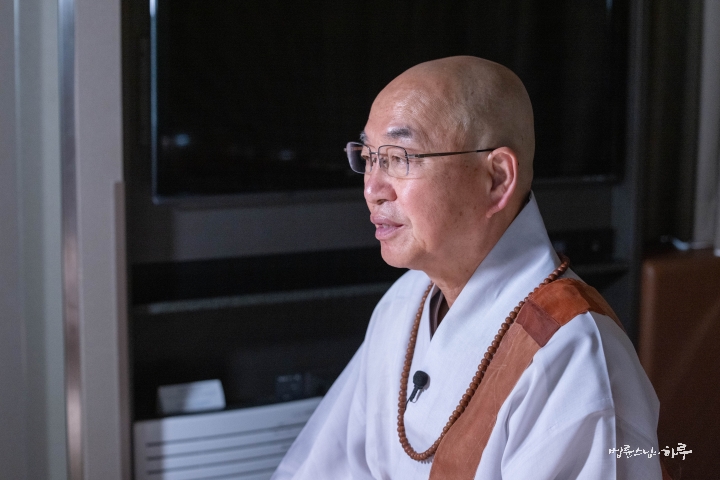
Let me tell you a story about my elementary school friend. One day, I received a call from this friend. He had been diagnosed with less than ten days to live and desperately wanted me to visit him. When I went to see him, he held my hand and said, ‘It’s too regrettable to just die like this. Even if I die, I would have no regrets if I could get examined at a major hospital in Seoul.’ He was hospitalized at a regional hospital, and after consulting with the attending physician, I learned that his liver cirrhosis was severe and the only solution was a liver transplant. Fortunately, his daughter offered to donate her liver, and the doctor said there was no other option. Since I didn’t know any hospitals in Seoul, I asked several Jungto Society members with broad social connections for help. One of them said, ‘I’m also receiving treatment for liver problems at a major hospital in Seoul. I have an appointment in three days, and I’ll ask my doctor if your friend can take my appointment instead.’ It was truly generous. Fortunately, the doctor agreed, and my friend received a liver transplant from his daughter and is still doing well. Whenever I visit the countryside, I ask him, ‘Are you still drinking?’ and he answers, ‘No!’ This is a case where the outcome turned out well. The daughter’s liver donation to her father had good results.
However, there are opposite cases too. Another person I know also had no option but a liver transplant, so he underwent surgery in Seoul to receive his sister’s liver. But he passed away right after the surgery. If he hadn’t had the surgery, he might have lived a few more months, but the surgery actually shortened his life. The patient passed away, his sister lost part of her liver, and they had to bear the surgical costs – this is what happened. That’s why hospitals have patients sign consent forms before surgery, stating ‘While the success rate is high, exceptional emergency situations can occur. Please make your choice knowing this.’
Even if you had made a different choice then, there’s no guarantee your mother would be alive now. Recently, a close acquaintance of mine returned from brain surgery abroad in poor condition. Detailed examinations in Korea revealed that the brain cancer had recurred. They started chemotherapy, but the condition worsened significantly. Judging that they had only one or two months left, they stopped chemotherapy, but they’re still alive today. The doctor now says they’ll probably be fine for another year. Situations don’t always unfold as predicted.
Just because a decision was made with good intentions doesn’t guarantee good results, and conversely, just because the outcome was bad doesn’t mean the decision was wrong. You did your best in that situation, but after your mother passed away, you developed guilt thinking ‘I feel like I caused her death.’ For example, suppose one sibling has been repeatedly self-harming for years due to mental illness, constantly saying ‘I want to die.’ After years of this, the family living together might become exhausted and impulsively say, ‘Fine, do whatever you want, live or die!’ If that person really died that day, you’d carry guilt for life. But they didn’t die because of those words. That day was simply a dangerous day regardless of intervention. So we cannot connect such outcomes to individual fault.
Anyone can think ‘Wouldn’t it have been better if I had done this?’ But continuing such hypotheticals makes it difficult to escape guilt. Recently, when someone died in a traffic accident, a person talked about their guilt, saying thoughts like ‘If I had prevented them from going out’ or ‘If I had told them not to go at the end’ kept continuing endlessly. However, such hypotheticals are just futile imagination that cannot change reality. So thinking that your mother died because of you is an overly sensitive reaction. If she had died during surgery, you might have felt even greater guilt thinking ‘I shouldn’t have agreed to the surgery.’
That incident is already in the past. Just take it as a lesson to be more careful in similar situations in the future, and focus on living your own life. You did nothing wrong. If you didn’t stab with a knife, give poison, or push her off a cliff, then personal fault cannot be determined. Unless the doctor made a specific mistake, it’s difficult to hold the doctor responsible either. These days, doctors are being sued for such issues, leading to fewer doctors willing to perform surgeries. In such times, we need an attitude of accepting given situations. And above all, if you live in suffering because of your mother, that wouldn’t be what your deceased mother would want. Now you need to have a perspective on living your own life.”
“Thank you. I feel much more at ease. I realized I just need to live happily, including my mother’s share.”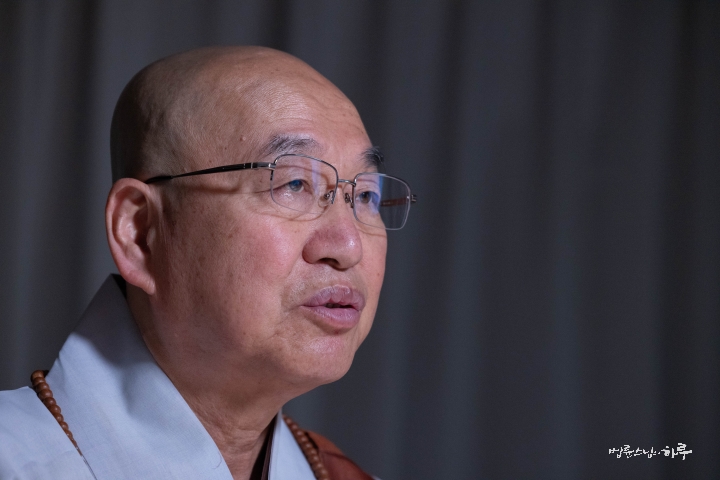
“You don’t need to live your mother’s share too. Just live your own life well in your own way. The reason your mother gave birth to and raised you was ultimately for her daughter to live healthily and happily, wasn’t it? If you become sick and withdrawn and can’t live properly, wouldn’t that rather make your mother’s efforts in vain? Living well is the way to repay your parents’ efforts. Repaying their grace doesn’t mean you have to do everything perfectly for your parents. Living healthily and happily is the way to repay their grace. I hope you’ll live your future life with this perspective.”
“Thank you.”
Questions continued. After finishing the dialogue, Sunim reminded everyone once more about Jungto Society’s upcoming year-end events before ending the live broadcast. After the Dharma assembly, he packed his belongings and went out for lunch.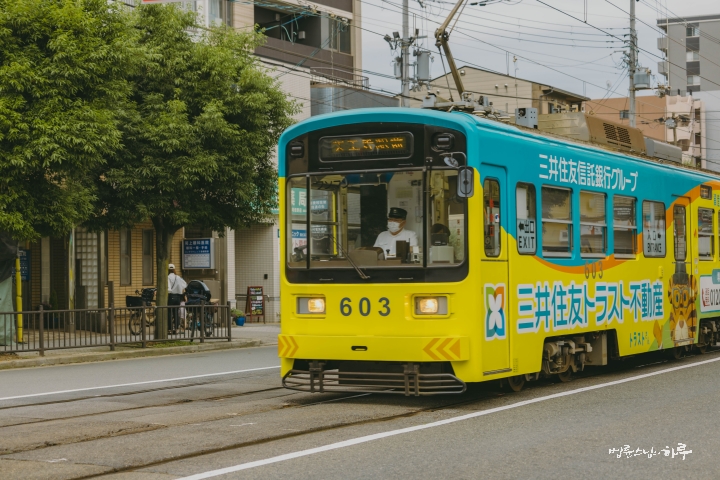
A person who was deeply moved by Sunim’s Dharma Q&A and “A Day in the Life of Sunim” and who prepares accommodation and meals whenever Sunim visits Japan, once again treated him to lunch at a Korean restaurant in the Tennoji district of Osaka.
After lunch, at 2:30 PM, Sunim visited Shitennoji Temple near the restaurant. This is Japan’s first Buddhist temple built at the national level, the oldest temple in Japan, and a place deeply connected to the establishment of Japanese Buddhism.
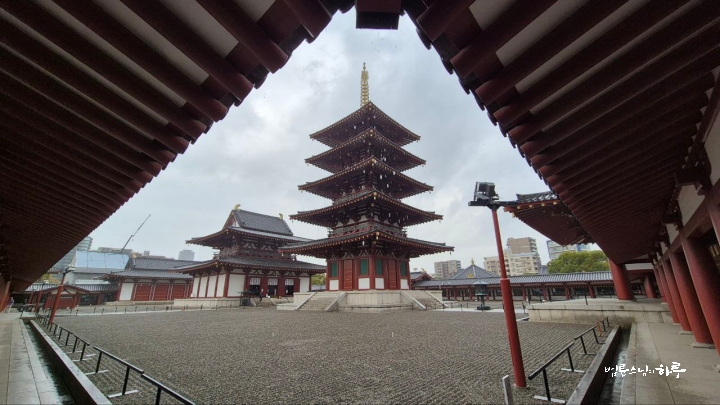

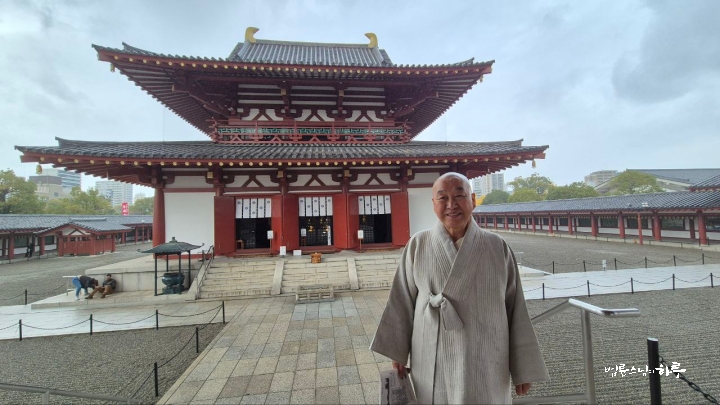
After touring Shitennoji Temple, Sunim headed to the lecture venue. Today’s lecture is being held at the Osaka City Higashinari Ward Community Center, a multipurpose community space where local Osaka residents can hold meetings, lectures, and cultural events. The venue was moved closer to Koreatown than last year’s location.
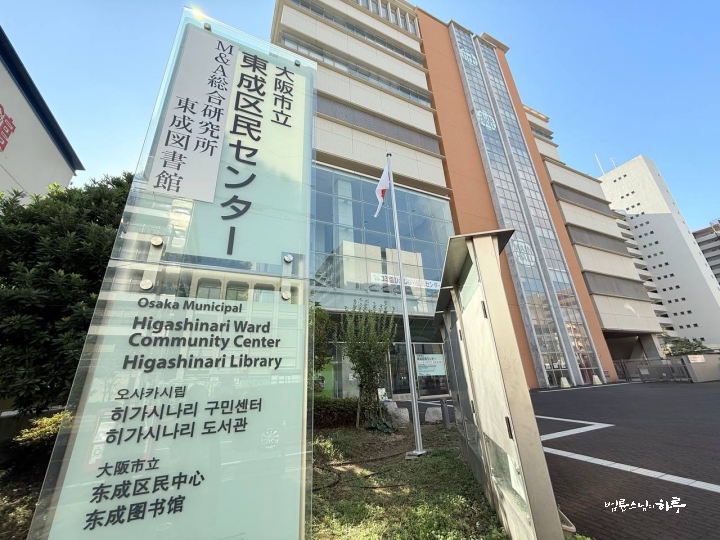
When Sunim arrived at the lecture hall, about 30 volunteers warmly welcomed him. Since volunteers from other regions and Tokyo had to leave immediately after the lecture to catch the last train, they took a group photo before the lecture began.
“Osaka, fighting!”
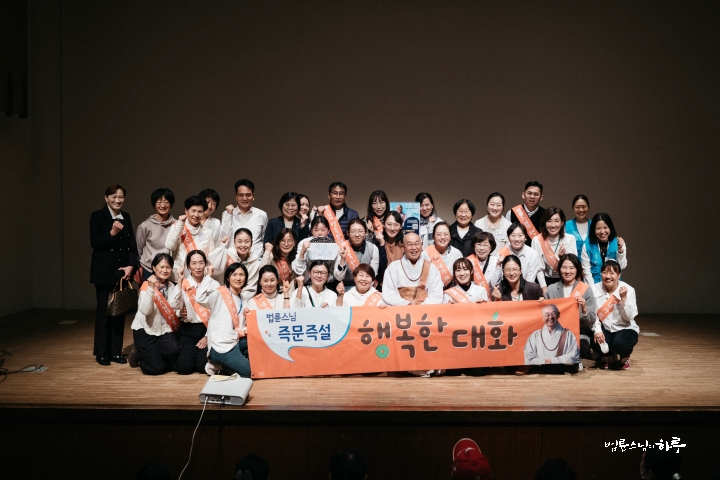
The volunteers went to their respective positions to prepare to welcome the audience. Soon, audience members began arriving at the lecture hall.
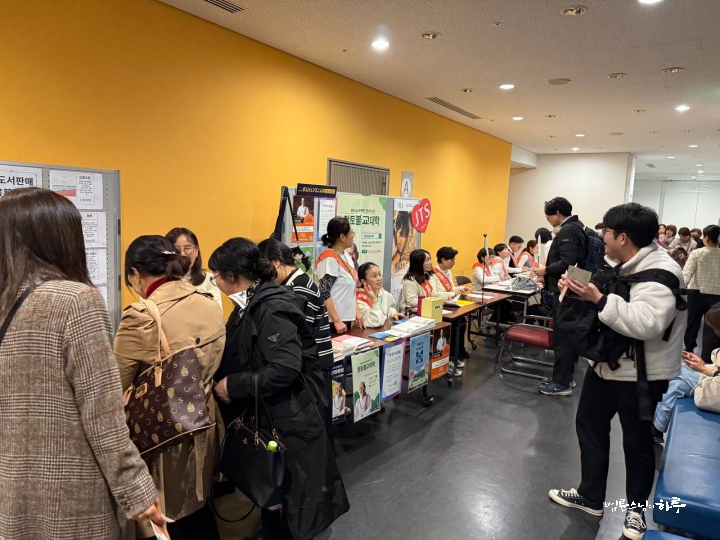
Sunim had tea and conversation with guests who visited the waiting room, then moved to the lecture hall together when it was time to begin the lecture.
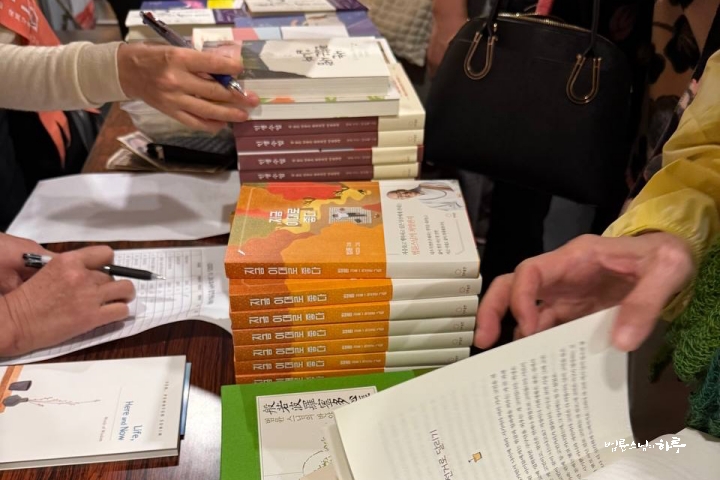
At 6:30 PM, a video introducing Sunim was shown with Japanese subtitles. When the video ended, Sunim walked onto the stage to great applause and cheers. With a bright smile, Sunim gave his greeting.

“Today’s dialogue was originally arranged for Korean residents in Japan. However, since some second or third-generation Korean residents don’t speak Korean well, and there are also Japanese people interested in Dharma Q&A, we’ve decided to proceed with Japanese interpretation today. This creates two issues. First, interpretation takes time, which reduces the number of people who can ask questions. Second, it becomes a bit awkward when Korean speakers laugh before the interpretation is finished. Even if you want to laugh or applaud, please wait until after the interpretation is complete. See, you’re already laughing before the interpretation is finished.” (Laughter)

After explaining the purpose of the Dharma Q&A, Sunim began taking questions. Those who had pre-registered their questions raised their hands first to have conversations with Sunim, followed by questions from the audience.
Over the course of about two hours, six people asked questions. One person sought Sunim’s advice on how to cultivate gratitude while living with a husband who constantly complains.
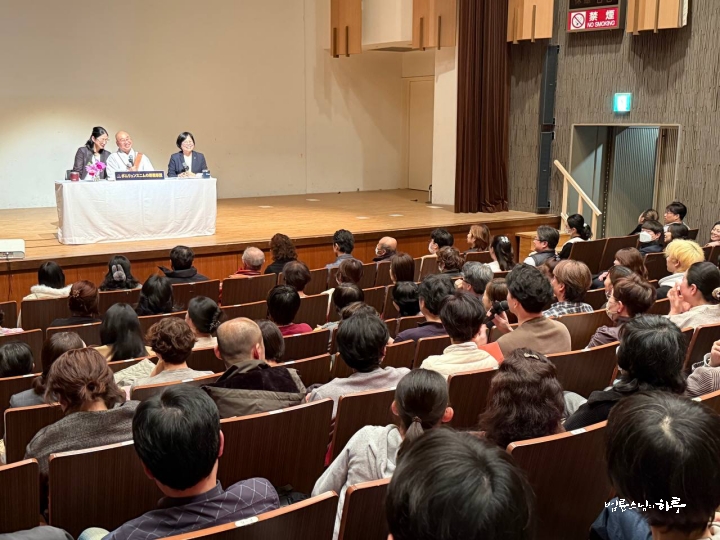
My Husband Swears While Watching TV and Driving. How Should I Deal With Him?
“People like you keep distorting what I say. What has your husband done well that you should pray with gratitude? If you know me so well, why don’t you come up here and speak yourself? (Laughter)
In this case, there are three main ways to respond. First, you need to diagnose why your husband has these reactions. The cause is usually stress. Whenever this happens, just think, ‘Oh, my husband is under a lot of stress.’ Just as you would think ‘they must be hurting’ when a child cries, observe without judging right or wrong. When people accumulate stress, they try to relieve it somehow – whether by swearing or other means – to survive. ‘He must be under a lot of stress. So he’s releasing it by swearing.’ This way of observing things as they are is the first method.
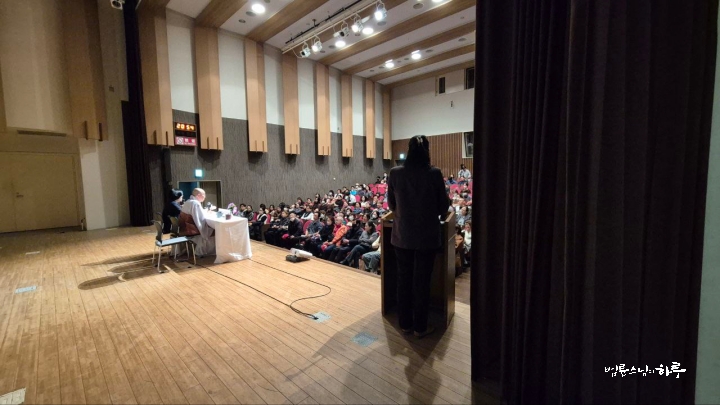
Second, you can swear even louder than your husband. React more strongly to whatever your husband is swearing about. For example, if a car cuts in and your husband says, ‘That bad person!’ you can say, ‘What a person who deserves to die!’ and swear even more strongly. This is a method of helping release your husband’s stress.
Third, whenever your husband shows such reactions, hug him and pat his back. Have a compassionate heart thinking, ‘How frustrated he must be to act this way.’
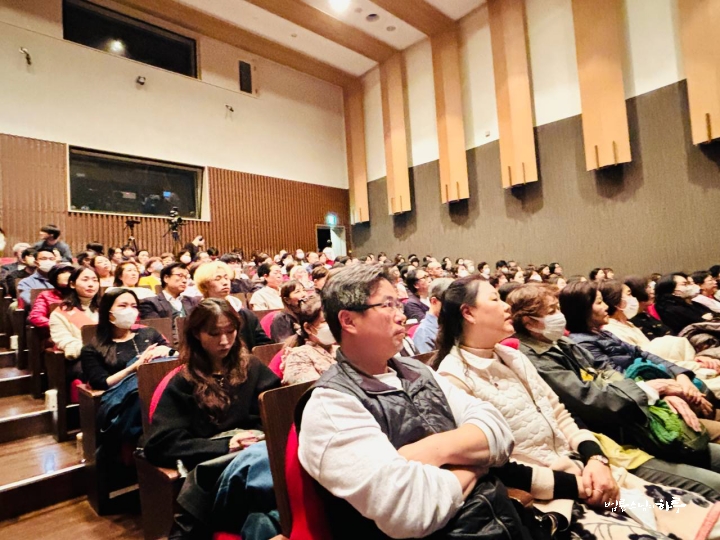
What’s important here is not ‘what help will these three methods be to my husband?’ but that with this perspective, your husband’s words and actions won’t be a problem for you at all. Even if you feel sorry for your husband and pat his back, it’s no problem for you. Even if you just observe thinking ‘He must be under a lot of stress,’ it’s no problem for you. Even if you swear louder, it’s no problem for you. In fact, swearing louder might be the most helpful for your husband. He might say, ‘Why are you acting like that? It’s not worth killing someone over. They just made a small mistake.’ (Laughter)
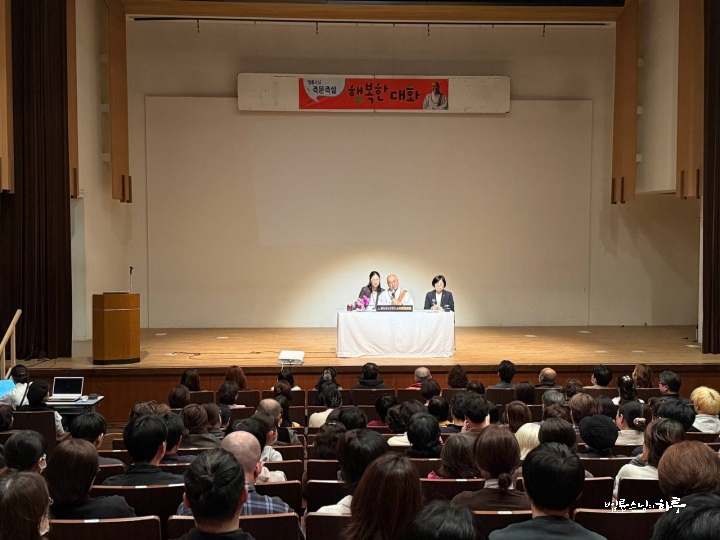
With this perspective, you can live with someone who has this kind of personality. But seeing that you haven’t separated from your husband despite his personality, he must earn good money and have many good qualities. This is the only problem, but everything else must be fine, which is why you’re living together.”
“That’s right.”
“Since he has many other good qualities, what can you do?”
“I understand well. Thank you. I’m relieved that I don’t have to pray with gratitude for my husband. I’ll try the third method you suggested.”
Questions continued one after another.
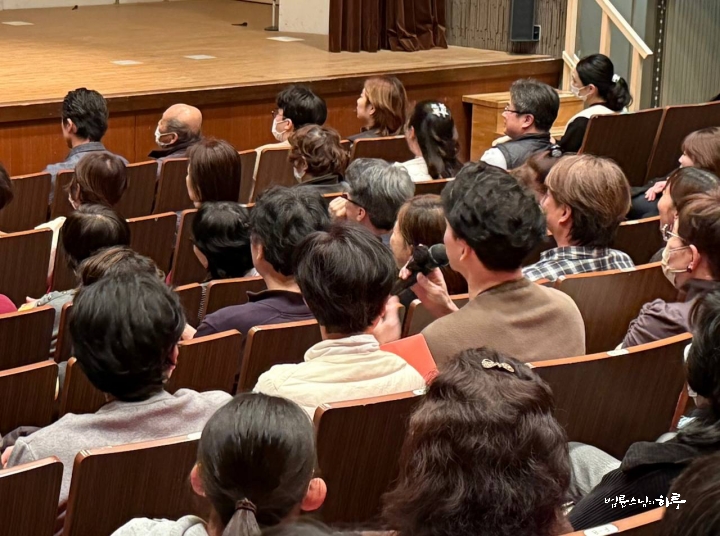
I’m happy with my wife but struggling with how to handle Korean-Japanese historical perspectives. How should I approach my desire to go to Korea and apologize?
I’m exhausted from caring for my mother for a long time and placed her in a care facility, and I want to be free from guilt and burden. How can I find freedom in this relationship?
Life is hard with 10 years of depression and recurring workplace problems, and my boyfriend doesn’t understand. Will Jungto Society activities help heal my mental illness?
I haven’t seen my daughter for over 2 years during divorce proceedings and feel desperate. What can I do to see my child again?
I feel guilty about precepts and karma from repeatedly killing while learning to cook. How should I approach this situation?
My child who had a brain tumor has a risk of recurrence, and I feel anxious with every checkup. If bad results come, how should I accept that karma?
After answering all questions, the lecture concluded at 9 PM.
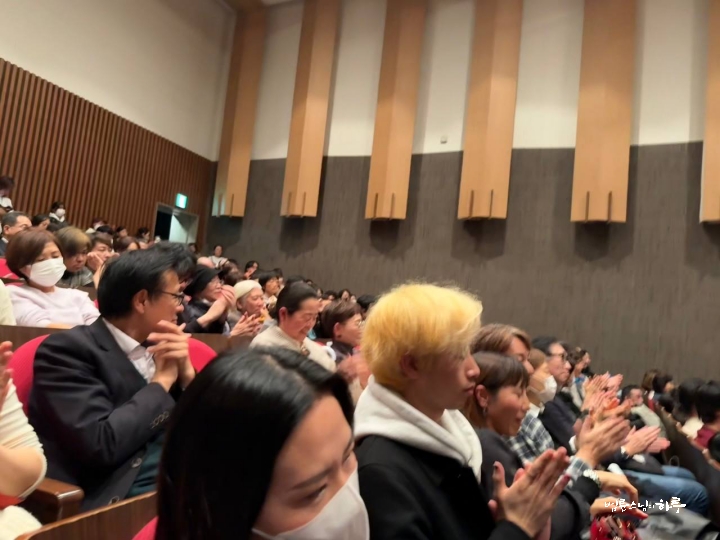
Immediately after, a book signing session was held on stage. Most of the audience lined up to receive Sunim’s signature and express their gratitude.

“Sunim, I respect you the most.”
“Thank you.”
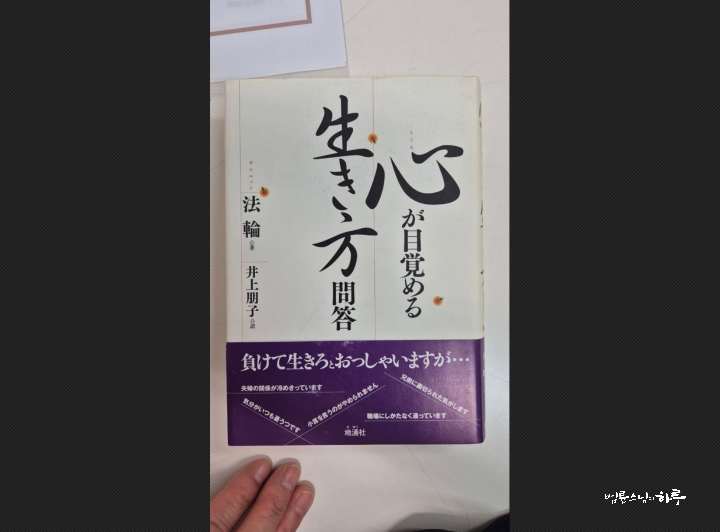
After the book signing, Sunim expressed gratitude to the volunteers and left the venue.
“Thank you all for your hard work.”
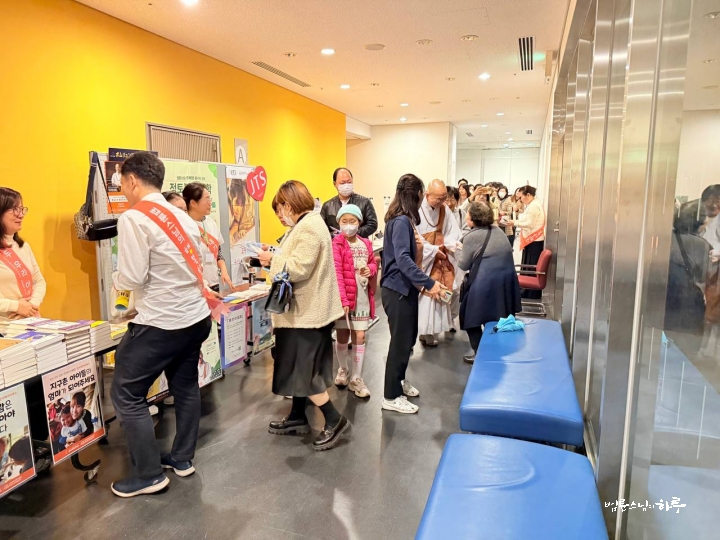
After leaving the venue, Sunim headed to his accommodation. Upon arrival, he reviewed manuscripts and handled administrative work before concluding the day’s activities.
Tomorrow, Sunim will take an early morning Shinkansen train to Tokyo. In the morning, he will meet with senior political figures to discuss normalization of North Korea-Japan relations. In the afternoon, he will give a lecture for Japanese audiences with Japanese interpretation, and in the evening, he will hold a Dharma Q&A session for Korean residents.




